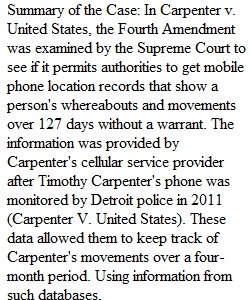


Q The purpose of this assignment is to explain the right of privacy afforded under the US Constitution and summarize key federal regulations addressing privacy. Instructions: 1. Pick one of the cases listed below. a. Is a warrant required for access to email? b. Supreme court tackles case involving cell phone privacy c. General Motors ONSTAR collecting information on owners/drivers forever 2. For your selection give: a. A summary of the case b. A discussion of the privacy considerations tested by the courts c. The final ruling of the court, if any d. Implications for the future based on the Constitution and this ruling/case. e. What regulations or Federal Regulatory agency would cover this incident? f. What does this case mean for other Technologies or online services not directly addressed by the case (Example if it is a case about email - are there implications for the internet or cell phones?) Submission Instructions: • Submit your case as a WORD document in the drop box for that assignment. (Properly formatted in MLA) Grading Criteria: • Refer to the grading Rubric for case analyses for additional guidance. • Worth 4 Points Assinmgent due Sunday, by 11:59pm EST.
View Related Questions